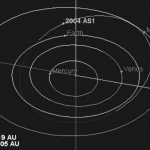The Inevitable Can Be Avoided…
Unlike earthquakes, an asteroid impact can be prevented.
Isn’t it ironic that the biggest disaster we fear is the only one that we can actually do something about—and yet this science comes last in the funding queue.
Many incorrectly look at asteroid research as yet another environmental concern looking for alms, when in reality it is more of a call to arms. After all, this science advocates preemptive defence against an incoming missile that, if large enough, could spell our doom.
Our cause is very different from any other you will encounter. Unlike every other known natural catastrophe where we remain helpless against the forces of nature (no matter how advanced our early-warning systems become), in the face of an asteroid, we are on the technological brink of being able to prevent the catastrophe from ever occurring in the first place.
Feasible blueprints and successful primary missions to intercept asteroids prove this, and scientist’s say that in the near future they will be able pull the impending disaster off its collision course. Splendid news, one would think, except for one huge flaw: we lack an adequate detection system, so we don’t know where these asteroids are.
In contrast, no matter how many tsunami detectors are scattered across ocean floors, they will never do anything other than save lives. Physical devastation associated with seismic activity can never be stopped, whereas the largest catastrophe of all can be preempted with some smart science and rocketry.
Something else that sets asteroid research apart from other natural phenomena is the fact that the cataclysmic event can be precisely predicted. And unlike its climatic and seismic counterparts, there will come a point when the “project” is complete (once 100 percent of the heavens have been mapped and our technology is able to deal with an incoming meteorite).
Basically, the asteroid threat cannot be equated to anything else: it’s different and should be treated differently. What we are saying is that this is a planetary defensive issue, and asteroid research should not be lumped in with other environment and disaster concerns. In fact, the funding itself should be coming from defence budgets—after all, we are talking about an incoming missile here.
If absolute proof were shown that a nuclear missile was aimed at your city, would you pay fifteen bucks to help stop it from ever hitting you?
Well, we have such irrefutable documented evidence. Simply put: there is a giant meteorite on a collision course with Earth, and it won’t matter where your hometown is. The only thing we don’t know is when it will hit.
This may sound like an unspecific familiar fob, but asteroid researchers could predict impact time with down-to-the-minute accuracy—this isn’t possible for any other impending disaster, man-made or natural—that is, it could if we had adequate equipment to do the job.
Drastic underfunding is the only reason we cannot tell you that your city is currently safe. Saying so is being no more alarmist than it would be for any other “not-in-my-lifetime” tsunami, earthquake, or volcano. The threat we are addressing is as real, with odds the stats say, on par with a plane crash or shark attack—and they all happen!
 Intelligence and early-warning systems are an integral ingredient in any defence plan, and that’s exactly what we propose. It seems ludicrous that with all the money spent on arms and intelligence around the world, the fellows in “radar,” looking for the biggest known missile of all time, are allocated the smallest subsidies, if any.
Intelligence and early-warning systems are an integral ingredient in any defence plan, and that’s exactly what we propose. It seems ludicrous that with all the money spent on arms and intelligence around the world, the fellows in “radar,” looking for the biggest known missile of all time, are allocated the smallest subsidies, if any.
To put this in its simplest terms, intelligence satellites can track a field mouse from outer space but they can’t see a football field behind them.
If all the governments in the world allocated just 1 percent of their defence budget towards this threat, the scientists would have enough funding to achieve 100 percent coverage of space, build a defence interception rocket, and probably send a man to Mars—a marvelously simple idea that is about as achievable as a world without taxes and corruption.
It’s an unavoidable fact that astronomers will have found an asteroid on a collision course with us by the time they achieve 100% coverage of our skies. It will only be a matter of how much time we have to deal with it (or them, as there will ultimately be more than one asteroid on track).
So far, we have achieved only partial mapping of our space for larger extinction-event asteroids, and scientists say that within a few years they will have covered all horizons. However, at the moment, we are still 100 percent blind to “smaller” projectiles with the capability of flattening greater London, like the near-Earth object a mere 60 meters wide that leveled 2,000 square kilometres in Siberia in 1908. These more numerous meteorites will remain unspotted for decades to come unless we intensify our research.
Governments do not prioritise this concern because the demands of more immediate earthly situations require their constant attention. One crisis after another keeps asteroid research from getting a foot in the funding door. Also, the authorities do not have the luxury of accurate prediction or prevention and are normally forced to focus on dealing with the logistics in the aftermath of a disaster.
Perhaps its time that “we the people” took a stand, or, to put it bluntly, that we stop relying on dithering governmental institutions and directly give the science a helping hand ourselves. We are lobbying for the defence of our planet against a phenomenon that could hurt us all very badly.
Your planet needs you. Join up today—it could make a difference to all our tomorrows.




